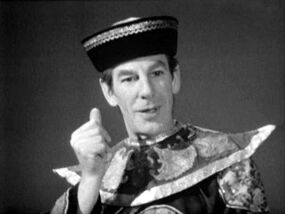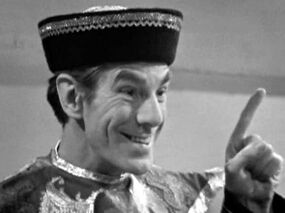The Toymaker: Difference between revisions
m (routine T:CBOT cleaning) |
(Removing "unknown" and "possibly" from infobox.) |
||
| Line 1: | Line 1: | ||
{{Infobox Individual | {{Infobox Individual | ||
|image = Celestial Toymaker.jpg | |image = Celestial Toymaker.jpg | ||
|alias = The Guardian of Dreams | |alias = {{il|The Guardian of Dreams|The Crystal Guardian|The Mandarin}} | ||
|species = Guardians of Time | |species = Guardians of Time | ||
|origin = | |origin = | ||
|appearances = {{il|[[TV]]: ''[[The Celestial Toymaker (TV story)|The Celestial Toymaker]]''|[[TV]]: ''[[The Nightmare Fair (TV story)|The Nightmare Fair]]''|[[COMIC]]: ''[[The Greatest Gamble (comic story)|The Greatest Gamble]]''|[[PROSE]]: ''[[The Nightmare Fair (novelisation)|The Nightmare Fair]]''|[[AUDIO]]: ''[[The Nightmare Fair (audio story)|The Nightmare Fair]]''|[[PROSE]]: ''[[Games]]''|[[PROSE]]: ''[[Divided Loyalties]]''|[[COMIC]]: ''[[Endgame (DWM comic story)|Endgame]]''|[[AUDIO]]: ''[[The Magic Mousetrap]]''|[[AUDIO]]: ''[[Solitaire]]''}} | |appearances = {{il|[[TV]]: ''[[The Celestial Toymaker (TV story)|The Celestial Toymaker]]''|[[TV]]: ''[[The Nightmare Fair (TV story)|The Nightmare Fair]]''|[[COMIC]]: ''[[The Greatest Gamble (comic story)|The Greatest Gamble]]''|[[PROSE]]: ''[[The Nightmare Fair (novelisation)|The Nightmare Fair]]''|[[AUDIO]]: ''[[The Nightmare Fair (audio story)|The Nightmare Fair]]''|[[PROSE]]: ''[[Games]]''|[[PROSE]]: ''[[Divided Loyalties]]''|[[COMIC]]: ''[[Endgame (DWM comic story)|Endgame]]''|[[AUDIO]]: ''[[The Magic Mousetrap]]''|[[AUDIO]]: ''[[Solitaire]]''}} | ||
|actor = Michael Gough | |actor = Michael Gough | ||
| Line 56: | Line 56: | ||
{{TitleSort}} | {{TitleSort}} | ||
[[Category:Guardians of Time]] | [[Category:Guardians of Time]] | ||
[[Category:Celestial Toyroom individuals]] | [[Category:Celestial Toyroom individuals]] | ||
Revision as of 16:15, 28 September 2013
- You may be looking for television story or its novelisation.
The Celestial Toymaker (also known as the Crystal Guardian and the Mandarin) was a powerful being who ensnared sentient beings in apparently childish games, with their freedom as the stakes. However, the Toymaker hated to lose and the games were always rigged in his favour.
Biography
Nature and powers
The Toymaker once claimed to be the embodiment of one of the fundamental forces of the universe, much like the Guardians of Time. Whereas the White and Black Guardians personified the absolutes of morality, however, the Toymaker was the avatar of games and illusions, known as the Crystal Guardian. (PROSE: The Quantum Archangel)
According to the Sixth Doctor, he originated in another universe before this one and was hauled into the Doctor's universe by some kind of catastrophe. Because of this, the usual laws of physics don't apply to him. The Toymaker himself stated that while in the beginnings of the universe he used his powers for other things, he eventually got bored of thousands of millennia of pointless creation and pointless destruction, and found a new source of amusement - games. (AUDIO: The Nightmare Fair)
The Seventh Doctor described the Toymaker as "a spirit of mischief from the infancy of the universe" to his companions Ace and Hex. (AUDIO: The Magic Mousetrap) He was one of the Elder Gods. (AUDIO: Black and White)
Within his realm, the Celestial Toyroom, the Toymaker commanded immense powers, but they were limited by the rules he set for any particular game, although he could bend these rules or 'forget' to mention them to his opponents if he so chose. He himself was immortal and invulnerable, and appeared capable of space and time travel at will. For some reason he chose to appear in the guise of a middle-aged Caucasian human dressed as a Chinese mandarin.
During the course of a game, one of the players might die outright or they might lose, in which case, the Toymaker would have total control over their life and personality, perpetually. (TV: The Celestial Toymaker) Apart from these children's games, the Toymaker sometimes played in person against his 'guests', most often games of chance such as cards or dice. There is evidence to suggest that if he was fairly beaten in such a game, the other player was allowed to go free, but if his opponent lost or tried to cheat he became another exhibit in the Toyroom. Such opponents included Gaylord Lefevre, a professional gambler from the American west; and a Roman soldier — though we never learn if the latter played fairly and thus gained his freedom. (COMIC: The Greatest Gamble)
Personal history
The First Doctor learned of the Toymaker when he was a youth at the Prydonian Academy. The Time Lords' data banks described him only as a vague legend. The Doctor and his friends Rallon and Millennia who, like the Doctor belonged to a clique known as the Deca, investigated the legend, travelling to the Toyroom in a stolen TARDIS. The Toymaker was in a dormant, disembodied state, but on their arrival he possessed Rallon and made Millennia one of his living toys. The Doctor defeated him, and the Toymaker allowed him to leave, knowing that he would become an even more worthy opponent given time to mature. (PROSE: Divided Loyalties)
During the latter days of his first incarnation, the Toymaker drew the Doctor's TARDIS back to his realm and made the Doctor and his companions play his games again. This time the Toymaker arranged things so that even if they won, the Toyroom would vanish completely at their moment of victory, leaving him the only survivor and the Doctor and his companions his subjects forever. The Doctor outwitted the Toymaker again and escaped, leaving his realm in chaos. (TV: The Celestial Toymaker) Rallon had been keeping the Toymaker's powers in check since he was first possessed. He made the Toymaker abide by the rules of his games to allow the Doctor to escape. (PROSE: Divided Loyalties) At the end of this adventure, the Doctor believed, incorrectly, that since he had won, the Toyroom no longer existed. (TV: The Celestial Toymaker)
The Toymaker discovered that after centuries of existence, Rallon's body was dying. He set out to ensnare the Doctor again and hatched a complex plot to turn his companions against him and absorb the Doctor as a new host. He was thwarted when Rallon forced himself to undergo multiple regenerations consecutively. The trauma expelled the Toymaker from his body. A projection of Rallon's potential future self merged with the Toymaker to ensure that the full powers of the immortal continued to be kept under control. While waiting for his Toyroom to repair itself, the Toymaker decided to take his servant Stefan to Earth to seek amusement. After seeing the idea in Tegan Jovanka's mind, he decided to take him to Blackpool. (PROSE: Divided Loyalties)
The Toymaker, now calling himself the Mandarin, appeared in Blackpool using a thrill ride, Space Mountain, as his base of operations, manufactured deadly video arcade games. He was stopped by the Sixth Doctor and placed in an impenetrable force field. Because the Mandarin's mental energy maintained the force field, the Doctor had set it up so that he could never escape it. (AUDIO: The Nightmare Fair)
Still calling himself the Mandarin, he escaped and played chess against Fenric during the latter's imprisonment. The Mandarin found himself on the verge of being outplayed, but slowly realised that, in this case, playing for a stalemate would be a victory of sorts. (PROSE: Games)
Eventually, the Toymaker returned, trapping the Eighth Doctor in a replica of the village of Stockbridge. Here he forced the Doctor to play games for control of a reality-warping alien device called the Imagineum. The Toymaker's pawn this time was a replica of the Doctor himself. The Doctor persuaded his double to turn against his master. With the Toymaker distracted, the Doctor used the Imagineum to create a replica Toymaker, which he set against the original. A stalemate ensued. The Doctor destroyed the Imagineum and freed Stockbridge from the Toyroom. The Toymaker was trapped in apparently perpetual battle with himself. (COMIC: Endgame)
The Toymaker somehow regained full control of his powers and lured several people into his domain, including the Seventh Doctor and his companions Ace and Hex. Working under the Doctor's leadership, the group of victims were successful in defeating the Toymaker and imprisoning his essence in a doll (or so it seemed). Each of them ate a piece of the doll, dividing the Toymaker so that he would no longer be capable of using his powers. The Doctor concocted an elaborate plan to keep control over the fragments of the Toymaker in the minds of each member of the group until the Toymaker withered away forever. As this plan involved the Doctor forgetting having made the plan in the first place, he wound up short-circuiting it. In the end, it was revealed that the Toymaker had been in control all along, allowing himself to be absorbed into humanity so that he could "feel what it was like to lose". Finally, one of the people involved, the chessmaster Swapnil Khan, managed to trap the Toymaker in a perpetual stalemate in his own dimension, but not before the Toymaker had reduced everyone except the Doctor, Ace, Hex, and Khan's daughter Queenie Glasscock to wooden dolls. (AUDIO: The Magic Mousetrap)
The Toymaker later captured the Doctor's TARDIS and took it to his Toyshop. He transformed the Eighth Doctor into a puppet. The Doctor's companion, Charley, was forced by the Toymaker to take part in his riddle, but was tricked by the Toyshop which shrunk to 0% of its original size and the body he was using was destroyed within it. The Toymaker swore that when his new body had formed he would take his revenge upon the Doctor and Charley, who had escaped the Toyshop's destruction. (AUDIO: Solitaire)
Other accounts
On another occasion, the Tremas Master had "what was once the Celestial Toymaker's favourite toy" and trapped the Graak inside it. (GAME: Destiny of the Doctors)
Behind the scenes
- According to Donald Tosh, the commissioning script editor and (uncredited) co-author of The Celestial Toymaker, the intention was that the Toymaker was, like the Monk who had predated him, a member of the Doctor's own race. (BBC DVD: The Time Meddler)
- In an interview, Peter Cushing stated that he believed that his human incarnation of the Doctor was canon, and that his film version of the Doctor and the television Doctor were bridged together by the Celestial Toymaker. His theory was that his Doctor is a future incarnation kidnapped by the Toymaker, who "wiped his memory and made him relive some of his earlier adventures."[1]


